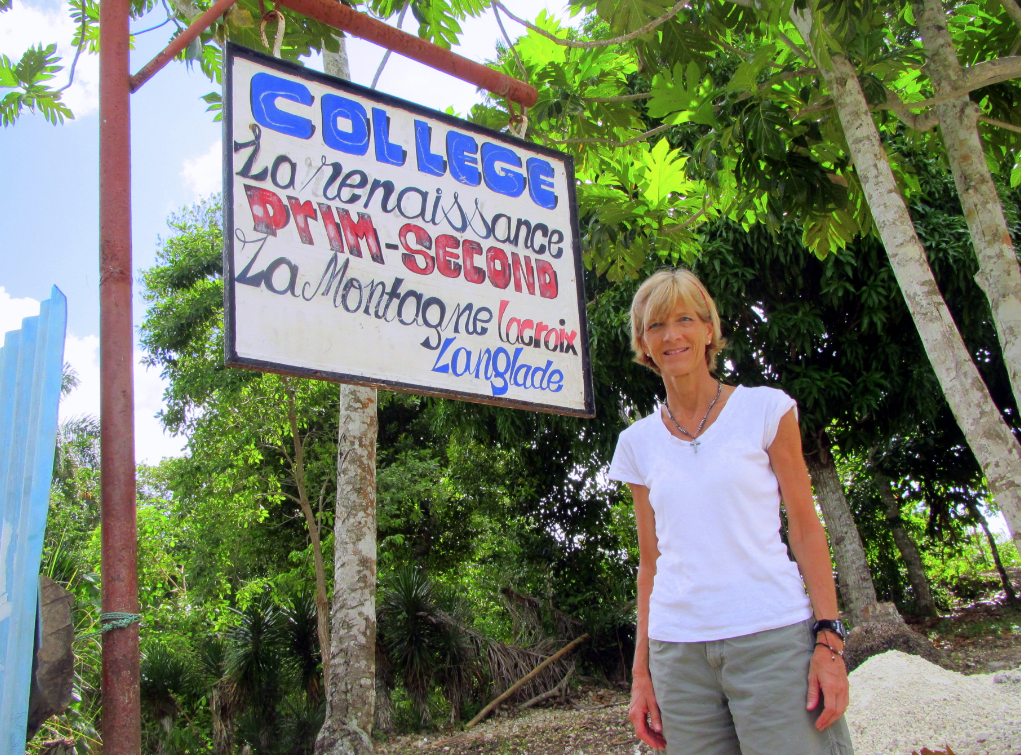
A two-week mission trip inspired Susan Sheridan to help improve education efforts in Haiti.
The director of the Nebraska Center for Research on Children, Youth, Families and Schools traveled to Haiti in September. She spent the majority of her time in La Montagne, a rural region far from the bustling cities of Jacmel and Port-au-Prince.
“La Montagne is up on the mountain range and it’s hard to get there because the roads were pretty much decimated and torn apart,” Sheridan said.
The destruction is in part due to last year’s 7.0 magnitude earthquake that left most of the Caribbean country in ruins.
“Haiti did not have much of an infrastructure to begin with to really leverage a lot of the foreign relief efforts,” Sheridan said. “Without the infrastructure, the aid continued to be these piecemeal efforts.”
Sheridan said she saw signs of reconstruction. But a lot of the rebuilding that has yet to take place is not just on highways and roads, but among Haitian people.
“What really set this experience apart, relative to other experiences I’ve had abroad, is the very personal nature of it,” Sheridan said. “I was interacting with people on every level — from helping a parent bathe her child to administering medicine through a syringe to teaching pregnant women how to take care of themselves and their unborn babies.”
Sheridan went to Haiti with Friends of the Children, a Wisconsin-based nonprofit organization that has provided medical and dental care in rural Haiti since 1998. Sheridan’s sister, a registered nurse, and brother-in-law, an emergency department physician, serve on the organization’s board of directors.
“She told me these stories about Haiti with all of this vivid imagery and I knew that there was something really special going on there,” Sheridan said. “So that’s what sort of piqued my curiosity.”
Friends of the Children set up a makeshift clinic in an empty parish compound, where the church was converted into a triage unit.
In 14 days, the clinic saw 3,000 patients seeking care for a wide array of medical issues.
“People would come in with their hands almost completely severed from machete accidents,” Sheridan said. “My brother-in-law fixed up and sewed the skin of one victim who came back the following week and was moving his fingers. I keep thinking that if the accident happened a week after we left, that person probably would have had infection and gangrene set in — that could have been a life sentence.”
A trained psychologist, Sheridan’s experiences during the trip ranged from visiting educational administrators to teaching midwife classes to meeting with psychiatric patients.
She was also able to help one man with an undiagnosed case of adult-onset schizophrenia.
“His mother put him around a post with shackles around his ankles and wrists because he’d been out slashing his machete around and she thought the devil was in him,” Sheridan said. “Once they got him on the right anti-psychotic medication, I interviewed him and he was a completely different person. Now he’s working in the village and able to sustain a very independent lifestyle.”
That experience reinforced Sheridan’s faith in the power of education to transform lives in a quantifiable way.
“Education, education, education — that’s really all that it’s about,” Sheridan said. “We’re not trying to change their culture or minimalize their belief systems. We want to show that medicine and education can help them lead healthy lives.”
As director of the Nebraska Center for Research on Children, Youth, Families and Schools, Sheridan conducts research based on her interactions with educators and students in Nebraskan schools, specifically in rural areas of the state.
“My trip (to Haiti) aligns so well with what we’re doing here at the center,” Sheridan said. “We’re about reaching and exceeding potential and when we think about the potential of the Haitian people, it’s endless. With a little education, they can go so much further.”
Sheridan and the center are currently developing a mechanism through which people can donate money directly to the educational reform efforts in La Montagne. In the meantime, Sheridan said anyone who’s interested in contributing to her cause is welcome to contact her via phone or email.
“There’s really nobody who is focused on education reform in La Montagne,” Sheridan said. “I’m committed to using our resources to create opportunities for people to step up and help improve the state of education in Haiti, at least in this mountainside area of La Montagne where I stayed and did my work.”
Fifty percent of Haitian children do not attend school. Of that number, about 75 to 80 percent don’t make it past the sixth grade, largely because they have to fund their own schooling.
Ten dollars covers the costs of materials for a child to go to school for an entire year. That money pays for items like pencils, paper, a backpack — none of which is currently provided by the education system in Haiti.
“I’m a firm believer that we are a very privileged society and with that comes responsibility,” Sheridan said. “We’re on this earth for such a short amount of time when you think about it. When I was walking down this little trail between the compound and the clinic, I looked around and thought, ‘I need to do more of this.’”
— Mekita Rivas, University Communications